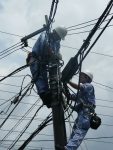If you become an electrician, what would be your working hours? Your schedule?
While the average American works 47 hours a week, would you have to work more or less than that?
On this page, we will talk about…
- The average workweek of an electrician
- Some factors that can influence the electrician’s work hours
The Regular 40-Hour Work Week
Most electricians maintain a normal 8-hour workday during weekdays.
They usually start from 9 am to 5 pm, but some may have to start earlier, such as at 7 or 8 am.
Annually, they will spend around 1,800 to 2,080 hours on average providing electrical services.
If they do overtime, this number will be much higher.
Working Hours of Apprentice Electricians
Apprenticeship programs require a set of total hours for field experience that you must complete.
Generally, apprentice electricians work the same 40 hours a week as licensed electricians during training.
These 40 hours exclude the time they’ll spend on classroom learning, which can take place once a week or after work.
Working Hours of Union and Non-union Electricians
One of the advantages of being a union electrician is that the union will negotiate your working hours.
They guarantee a certain number of hours per week, and any overtime hours will be paid at a negotiated rate.
Usually, overtime is paid at a time-and-a-half rate.
Union jobs can be more long-term since they are usually much larger in scale.
However, non-union (open shop) employed electricians have their benefits as well.
Open shops can negotiate work with more flexibility, so there can be more overtime options.
Also, since the open shops often perform smaller jobs that are finished faster, it can be easier to find work during downtime between jobs.
In both instances, the workweek is usually 40 hours.
The “generally accepted” idea, though, is that non-union electricians can work more hours but at a lower hourly rate, while union electricians get fewer hours but earn a higher rate.
Factors that Affect the Working Hours
Some aspects can add or reduce the working hours a week, which are listed below.
Your Workplace
Electricians work in a variety of locations under different work agreements.
Some work for a certain facility or company (e.g., a hospital) where there’s a set schedule.
Others may have to work in various sectors, resulting in servicing different clients.
And so, their hours will be different from one job to another where there’s a possibility of having to work more.
The Region Where You Work
In some parts of the country, electricians are in-demand, with an abundance of work to take over.
These people can work for over 2,000 hours a year on average.
However, other regions may offer fewer job opportunities due to reasons like geographical location and economic strength.
For this reason, many electricians will have to travel outside the region for work, which can often lead to better job prospects.
Those jobs usually come with good overtime pay and can be quite profitable.
Downtimes
Sometimes, between jobs, there can be downtime which can affect the number of working hours per year.
It may happen while you’re waiting for the job to be assigned by the union, or when work in the open shop has dried up.
In some areas in the U.S., it rarely happens, while in others, it can be common.
Weather Conditions
Due to the weather, work opportunities can become unpredictable.
If you work outdoors, fog, rain, sleet, or snow can delay the job.
Maintenance Jobs
Most of the time, maintenance jobs are done during regular working hours.
But some of them may have to be completed outside of the client company’s working hours so as to not disturb their employees.
Emergencies
Similar to other construction trades, sometimes systems can go down and need fixing as soon as possible.
As the expert, you have to be available at any time, sacrificing your rest day, to handle the emergency.
These situations may happen during your regular shift or outside of it.
Self-Employment
According to the Bureau of Labor Statistics, approximately 9% of electricians in the U.S. are self-employed.
Working like that, you can have more flexible hours and choose your own schedule.
Running a small business, though, brings a lot of responsibilities.
Most business owners work more than 40 hours a week to gain more profit.
And so, you would have to seek new businesses, maintain business relations, and advertise your services.
All this requires time and adds to your regular electrical work.
This page is also available in Spanish.










